
Iqaluit is the capital of the Canadian territory of Nunavut, its largest community, and its only city. It was known as Frobisher Bay from 1942 to 1987, after the large bay on the coast of which the city is situated. In 1987, its traditional Inuktitut name was restored.

The Qikiqtaaluk Region, Qikiqtani Region or Baffin Region is the easternmost administrative region of Nunavut, Canada. Qikiqtaaluk is the traditional Inuktitut name for Baffin Island. Although the Qikiqtaaluk Region is the most commonly used name in official contexts, several notable public organizations, including Statistics Canada prefer the older term Baffin Region.
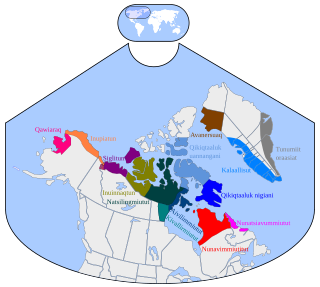
Inuktitut, also Eastern Canadian Inuktitut, is one of the principal Inuit languages of Canada. It is spoken in all areas north of the tree line, including parts of the provinces of Newfoundland and Labrador, Quebec, to some extent in northeastern Manitoba as well as the Northwest Territories and Nunavut. It is one of the aboriginal languages written with Canadian Aboriginal syllabics.

Arctic Bay is an Inuit hamlet located in the northern part of the Borden Peninsula on Baffin Island in the Qikiqtaaluk Region of Nunavut, Canada. Arctic Bay is located in the Eastern Time Zone although it is quite close to the time zone boundary. The predominant languages are Inuktitut and English. At the 2016 census the population had increased by 5.5% from the 2011 census to 868. Arctic Bay is notable for being the birthplace of the former Premier of Nunavut Eva Aariak.
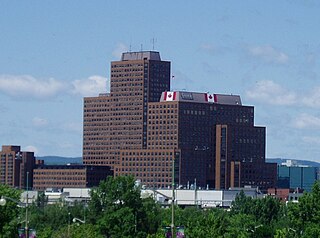
The Department of Crown-Indigenous Relations and Northern Affairs Canada is the department of the Government of Canada responsible for Canada's northern lands and territories, and one of two departments with responsibility for policies relating to Indigenous peoples in Canada.

Resolute or Resolute Bay is an Inuit hamlet on Cornwallis Island in Nunavut, Canada. It is situated at the northern end of Resolute Bay and the Northwest Passage and is part of the Qikiqtaaluk Region.
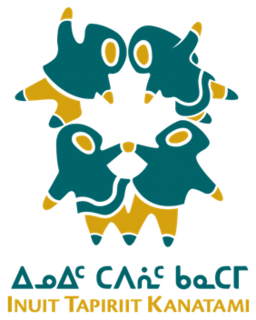
Inuit Tapiriit Kanatami is a nonprofit organization in Canada that represents over 60,000 Inuit.

Nunavut Arctic College is a Crown corporation that is funded by the Government of Nunavut and has several campuses and centres spread out throughout Nunavut, Canada.
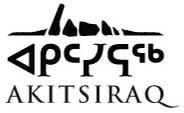
Akitsiraq Law School is a legal education program designed to increase the number of lawyers in Nunavut and the Canadian Arctic, including a program leading to a Bachelor of Laws Degree (LL.B.) in Iqaluit, Nunavut.

Kinngait ; Syllabics: ᑭᙵᐃᑦ), formerly known as Cape Dorset, is an Inuit hamlet located on Dorset Island near Foxe Peninsula at the southern tip of Baffin Island in the Qikiqtaaluk Region of Nunavut, Canada.
Ann Meekitjuk Hanson was the Commissioner of Nunavut. She served from April 21, 2005 until April 10, 2010. Hanson, like all Inuit born between the 1940s and the 1970s, was labelled with a disc number by the Government of Canada, which, in her case was E7-121.
Nunavut Tunngavik Incorporated is the legal representative of the Inuit of Nunavut for the purposes of native treaty rights and treaty negotiation. The presidents of NTI, Makivik Corporation, Nunatsiavut, and the Inuvialuit Regional Corporation, the four regional land claims organizations, govern the national body, the Inuit Tapiriit Kanatami (ITK) as its board of directors. NTI continues to play a central role in Nunavut, even after the creation of the Government of Nunavut. As the successor of the Tunngavik Federation of Nunavut, which was a signatory of the Nunavut Land Claims Agreement on behalf of Inuit, NTI is responsible for ensuring that the Nunavut Land Claims Agreement is implemented fully by the Government of Canada and the Government of Nunavut and that all parties fulfill their obligations.
Inuit Qaujimajatuqangit is an Inuktitut phrase that is often translated as "Inuit traditional knowledge", "Inuit traditional institutions" or even "Inuit traditional technology". It is often abbreviated as "IQ". It comes from the verb root "qaujima-" meaning "to know" and could be literally translated as "that which has long been known by Inuit".

Clyde River is an Inuit hamlet located on the shore of Baffin Island's Patricia Bay, off Clyde Inlet, an arm of Davis Strait in the Qikiqtaaluk Region, of Nunavut, Canada. It lies in the Baffin Mountains which in turn form part of the Arctic Cordillera mountain range. The community is served by air and by annual supply sealift.
Tagak Curley is an Inuit leader, politician and businessman from Nunavut. As a prominent figure in the negotiations that led to the creation of Nunavut, Tagak is considered a living father of confederation in Canada. He was born in a hunting camp at Coral Harbour, Northwest Territories.
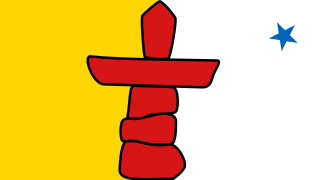
Nunavut is the newest, largest, and most northerly territory of Canada. It was separated officially from the Northwest Territories on April 1, 1999, via the Nunavut Act and the Nunavut Land Claims Agreement Act, though the boundaries had been drawn in 1993. The creation of Nunavut resulted in the first major change to Canada's political map since incorporating the province of Newfoundland in 1949.
The Inuit Broadcasting Corporation (IBC) is a television broadcasting company based in Nunavut. Its programming is targeted at the Inuit population of Nunavut and almost all of its programs are broadcast in Inuktitut. Select programs are also broadcast in English. In contrast with traditional commercial television broadcasting companies, IBC shows centre on Inuit culture. The company has five production centres in various places in Nunavut, all staffed by Inuit. Founded in the early 1980s, the IBC was the first Native language television network in North America.

Higher education in Nunavut allows residents of this Canadian Arctic territory access to specialized training provided at post-secondary institutions. There are some unique challenges faced by students wishing to pursue advanced training in Nunavut, a vast territory stretching across Arctic Canada from Hudsons Bay to the north pole. The territory was split from the Northwest Territories in 1999, following a successful plebiscite which affirmed Inuit desires to establish an independent political jurisdiction. Covering one-fifth of Canada's area and over 60% of its coastlines, the territory had a population of 31,153 in 2010.
The Nunavut Teacher Education Program (NTEP) is an important college/university program in the Eastern Arctic of Canada offered through Nunavut Arctic College. This program provides Inuit from Nunavut with the opportunity to work toward a degree while remaining in the Arctic. With this degree in education, graduates can contribute and shape the education system in Nunavut by becoming bilingual teachers or work for the Department of Education. If the Inuit language and culture is to survive during this time of cultural transition, it will be greatly assisted by programs such as NTEP which recognize the importance of infusing Inuit language and culture into the western schooling system that is currently being used across North America. This program is more than an educational program; NTEP is of political and epistemological importance as it recognizes and legitimizes Inuit knowledge, values and perspectives and provides Inuit with an opportunity to play an active role in education.
Pat Angnakak is a Canadian politician, who was elected to the Legislative Assembly of Nunavut in the 2013 election and reelected in 2017. She represents the electoral district of Iqaluit-Niaqunnguu.













